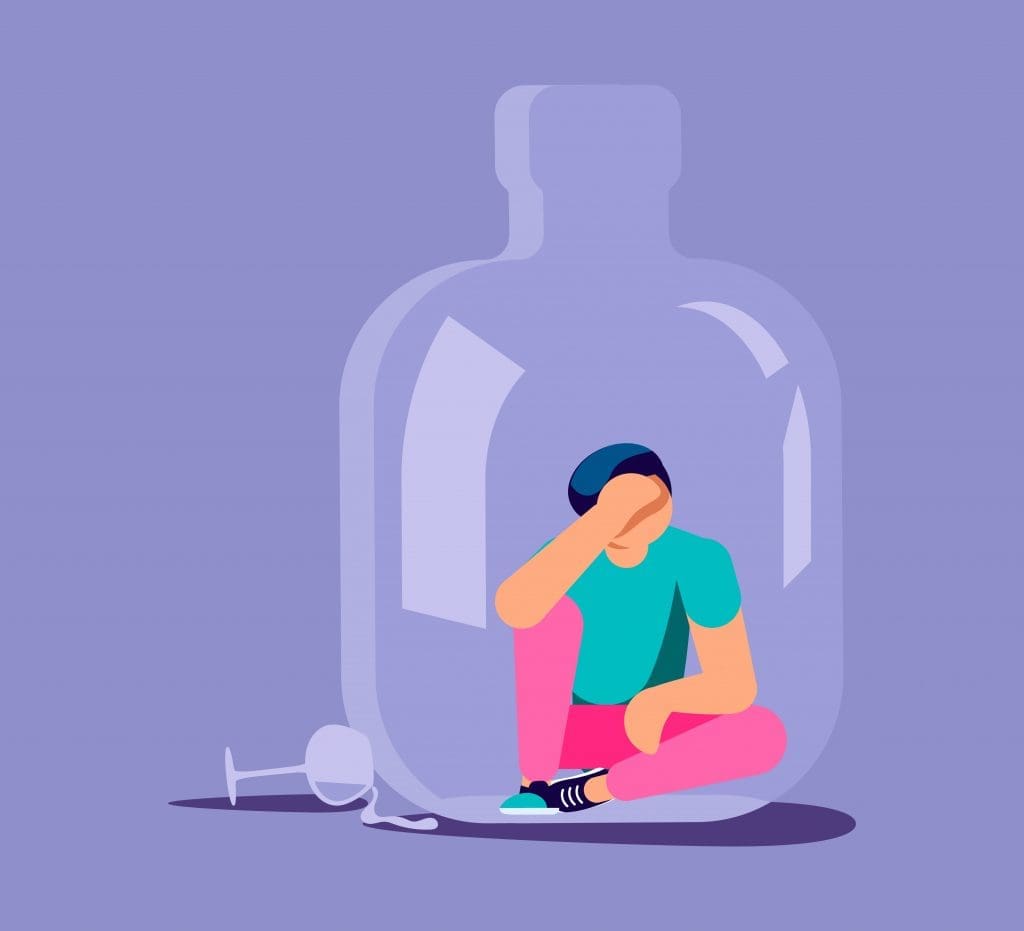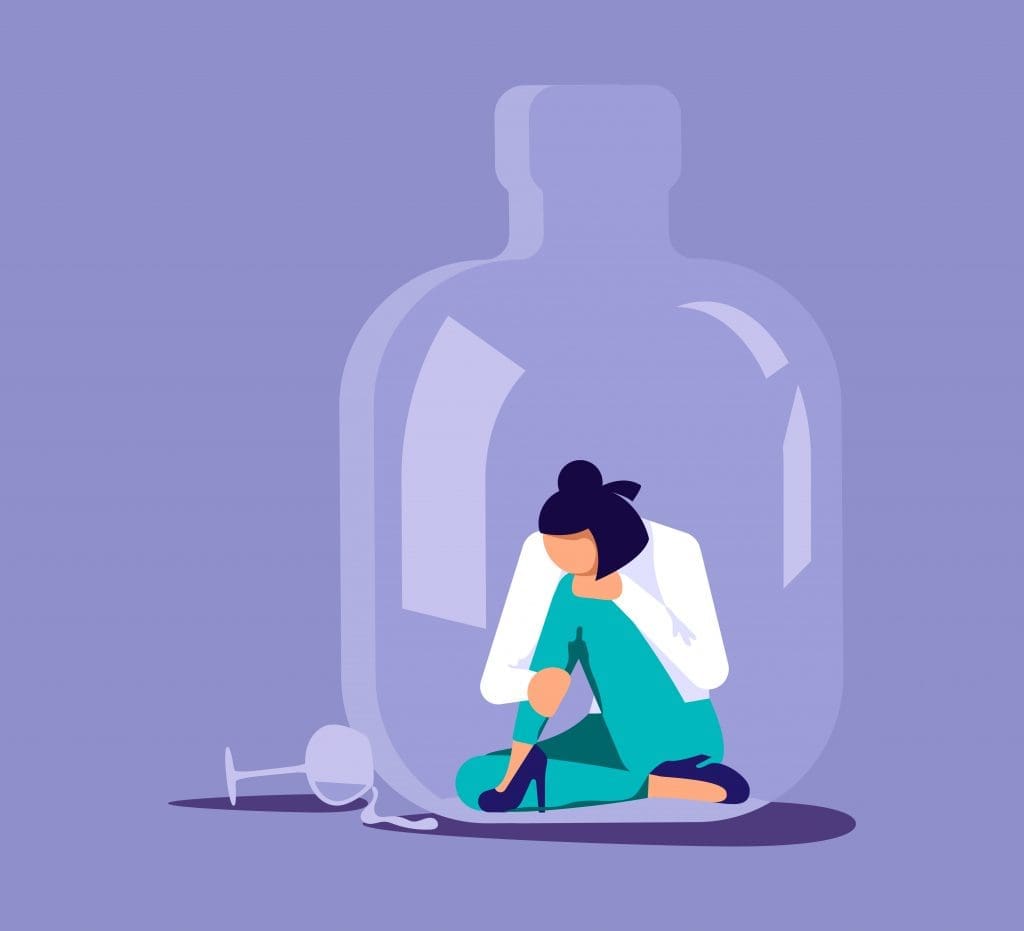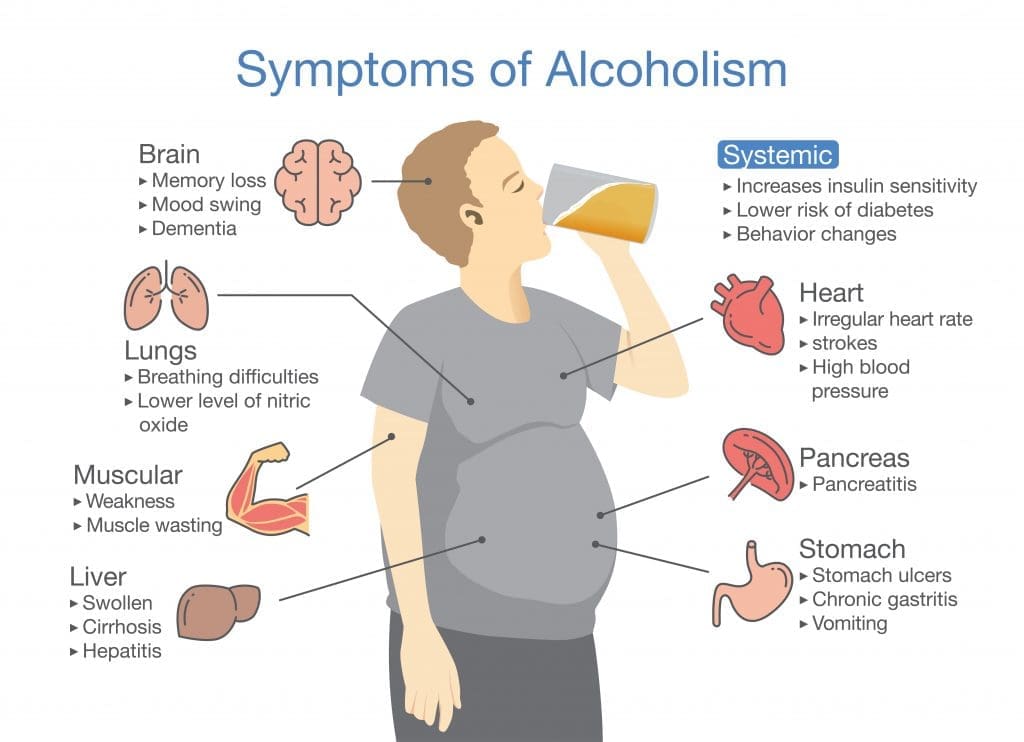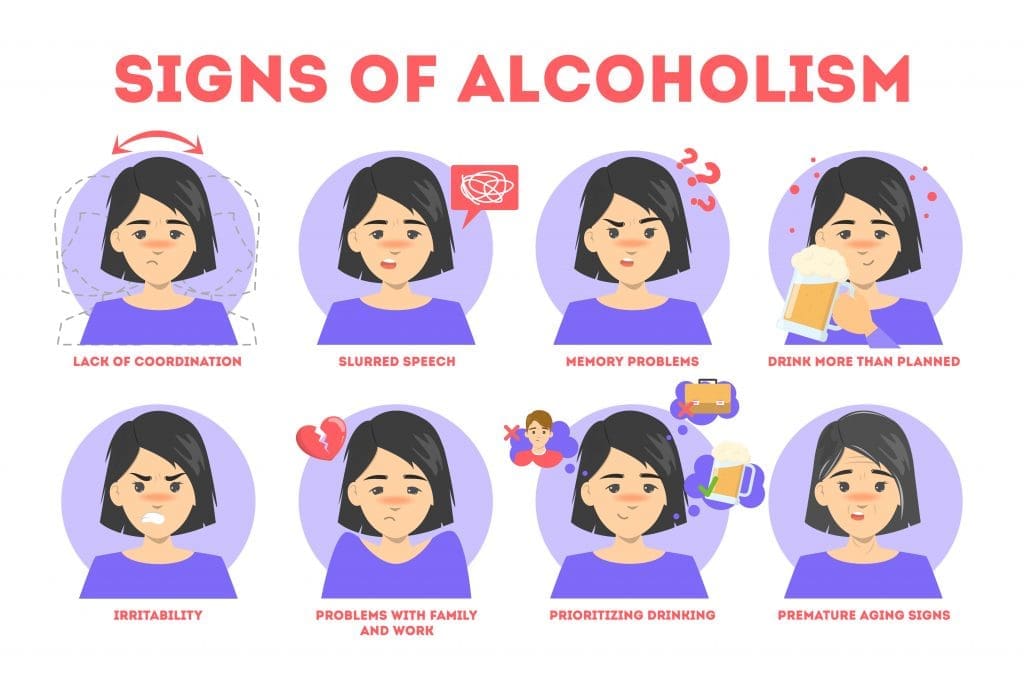Contents
- What is binge drinking?
- Short-term effects of binge drinking
- Dangers of binge drinking and its long-term effects
- Who binge drinks?
- What causes binge drinking?
- Why cant I control my drinking?
- How do I stop binge drinking?
- Treatment for binge drinking
- References
If you want to stop binge drinking but are wondering how to go about it, Delamere have valuable insight to offer as to why some people lose control of their drinking on a regular basis. We also advise how you can regain control and how to stop binging on alcohol.
Binge drinking is VERY common in the UK. Statistics show, that of the 29 million people who drink alcohol, 7.8 million (26.6%) binge drink on their heaviest day of drinking 1

Research conducted by the CDC shows that around 1 in 6 people binge on alcohol four or more times a month. These stats provide a mere snapshot of the scale of the problem binge drinking presents 2
Binge drinking is a form of alcohol abuse and is a recognised factor in many alcohol use disorders (AUD’s). It, (binge drinking), often carries negative consequences, not only to the person that suffers but also affecting those that surround them.
Binge drinking can also sadly and sometimes irreversibly affect an innocent bystander, who can be drawn into an intoxicated person’s chaos or have harm inflicted upon them.
If binge drinking is affecting you or someone you love, it is recommended that professional help and treatment is sought to overcome the problem.
What is binge drinking?
Binge drinking is when a large amount of alcohol is consumed over a short period of time. This type of drinking results in a person experiencing the effects of acute alcohol intoxication.
The more a person drinks and over a shorter time frame, the more they lose control over their composure, behaviour and perspective. Binge drinking is an extreme example of this loss of self-control.
By definition, the Office of National Statistics states that binge drinking is consuming over 8 units of alcohol for men and 6 units of alcohol for women in a single drinking episode 1
However, it is important to recognise that every one is different. Your individual tolerance to alcohol and how many drinks it takes you as a person to become acutely intoxicated could very much differ from someone else.

Call us confidentially at any time to speak to a member of our team.
Call us now: 0330 111 2015
The short-term effects of binge drinking
Binge drinking causes a number of physical and psychological effects, brought about by how alcohol affects the brain.
The short term effects of binge drinking last as long as a person is severely intoxicated; they are usually followed by what is often referred to as a ‘hangover’. A hangover is a collective of unpleasant symptoms that follow on from a heavy drinking bout.
Short-term physical effects of binge drinking include:
- Dizziness
- Drowsiness
- Sleepiness
- Loss of balance
- Nausea
- Vomiting
- Slurred/delayed speech
- Impaired vision
- Slowed reaction times
- Impaired motor skills
- Urinary incontinence
Short-term psychological effects of binge drinking include:
- Aggressiveness
- Agitation
- Anxiety
- Confusion
- Paranoia
- Melancholy (feelings of sadness, hopelessness and depression for no apparent reason)
- Impaired decision making
- Altered perception
- Impulsiveness
- Reduced inhibitions
- Reduced awareness of danger
- Impaired cognitive ability
- Impaired memory and ability to form new memories whilst under the influence (blackout)
The more alcohol you consume during one drinking episode and the lower your tolerance to alcohol, the more severe the short term effects of binge drinking are.

The dangers of binge drinking and its long-term effects
Whilst under the effects of binge drinking you become very vulnerable. In the event of being attacked, you will be less able to defend yourself or take appropriate action.
Acute alcohol intoxication can also make you more likely to place yourself in situations where something bad could happen through reduced awareness, poor decision making and an altered perception of danger.
Binge drinking carries many dangers, both immediately (short-term) and in the long-term, all of which have the potential to become life-threatening.
In addition to binge drinking carrying an increased risk of suffering or perpetrating voilence or sexual assault, there are many other situations and consequences that can potentially arise from being heavily intoxicated by alcohol.
Binge drinking carries the following risks and dangers:
- Risk of alcoholic poisoning – Alcoholic poisoning is very serious. At the very least it will make you very ill, at worst it can be life threatening. Binge drinking also interferes with the operation of the gag reflex and levels of consciousness, meaning a person who suffers from alcohol poisoning is more likely to violently vomit and choke, causing death.
- Risk of accident – Binge drinkers are at high risk of falling over or making decisions that could result in injury to themselves or to others
- Risk of alcoholic brain injury – Those that binge drink are at higher risk of suffering alcohol related brain injury. Whilst we can recover from a binge drinking episode relatively quickly, cognitive recovery comes at a much slower pace 3
- Risk of pregnancy or contracting STI’s/STD’s – Under the influence of binge drinking you are more likely to make decisions you later regret due to reduced inhibitions, poor impulse control and impaired decision making. A common example of such decisions includes sleeping with strangers and not taking precautions to prevent unwanted pregnancy or transmittable STI’s and STD’s
- Increased risk of violent and aggressive behaviour – Binge drinking is associated with uncharacteristic violent and aggressive behaviour. It also reduces the inhibilitions of those that already posses such tendencies, making them more prone to outbursts of anger and violence 4,5
- Increased risk of misscarriage, premature delivery, still birth, sudden infant death syndrome and development of fetal alcohol syndrome (FAS) – Binge drinking whilst pregnant or whilst trying to conceive can carry serious consequences to your unborn child, all of which are completely preventable by abstaining from alcohol 6,7
- Increased risk of developing alcohol dependence – The more frequently you binge drink, the more likely it is for the line between being sober and being drunk to become blurred. Suffering from frequent and severe hangovers, there may just come the time where you decide to continue drinking rather than suffer the consequences of another hangover.
- Increased risk of developing an alcohol related chronic disease – The more you binge drink the greater the risk of developing chronic alcohol related diseases including: heart disease, liver disease (cirrhosis), high blood pressure, several types of alcohol related cancer and diabetes.
- Increased risk of breaking the law – Binge drinking can cause a person to make irrational and poor decisions, decisions that they would not normally make whilst sober, or even mildly intoxicated. You are more likely to break the law whilst heavily intoxicated by committing offences such as drink driving, violence, disturbing the peace or through being drunk and disorderly
| Alcohol misuse is the biggest risk factor for death, ill-health and disability among 15-49 year-olds in the UK, and the fifth biggest risk factor across all ages |
Who binge drinks?

According to the Centre of Disease Control and prevention (CDC) binge drinking is most common in those aged 18-34 years old. However, more than half of the total sum of binge drinks is consumed by those that are 35 years or older 2
Binge drinking is also much more common in men than it is among women, with 80 percent of binge drinks being consumed by men 2
Out of those who were interviewed by The Office of National Statistics for the ‘Adult drinking habits in the UK report’, it was found that those with the highest earning capacity (annual income of £40k plus) were the also the greatest drinkers 2
In fact, 77.4% of people classed in the highest earners bracket were found to have drank alcohol in the week preceding the interview for the report. The percentage of drinkers then declined in accordance with income 2
Binge drinking was also found to be twice as common amongst the highest earners when compared to the lowest earners.
From these statistics, we can surmise that binge drinking is most common amongst younger males with the highest earning capacity. It could be argued that binge drinking amongst this group of people is brought about by the stress and drinking culture (peer pressure) that is often associated with ‘high flyers’.
If binge drinking is affecting you, your capacity to function at work and/or your home life, Delamere can help. Call our team for confidential free expert advice on how to stop binge drinking.
What causes binge drinking?
There are many contributing factors that can cause a person to binge drink, but really only one factor that can prevent a person from stopping.
If binge drinking is negatively affecting you and you want to stop but find you cannot, it could be that you suffer from alcoholism.
Alcoholism can present in many different forms and styles of drinking. All forms of alcoholism have one common factor, an inability to control alcohol.
A person may binge drink for any number of reasons, but continuing to binge drink despite negative consequences to their physical, emotional, social, occupational, financial or even personal relationships – strongly indicates an alcohol use disorder.
Causes of binge drinking (reasons) include:
- Stress
- Peer pressure
- The need to forget certain life events (i.e break up of a relationship or death of a loved one)
- Cultural pressure
- Mental health illness (i.e to relieve symptoms of anxiety, depression or post traumatic stress)
- Social anxiety and shyness
- Celebration
- Commiseration
It is important to understand that these reasons do not make an alcoholic, they can be a contributing factor for a person that occasionally binge drinks.
How many times have you observed people on a night out binge drinking? Many times perhaps, all these reasons have a certain amount of gravity in whether a person chooses to drink excessively.
The real problem comes when a person frequently loses control over the amount of alcohol they consume, drinking far more than they originally intended, or, always drinks with the intention of achieving oblivion.
The reasons for drinking in this way become irrelevant as the person is putting themselves, and sometimes others at great risk. There is nothing that can justify the chaos and danger that often accompanies this type of drinking
Why cant I control my drinking?

If you want to reduce the amount of alcohol you drink, stop binge drinking and regain control of your alcohol use but find you cannot, there is likely to be a very good reason for this. That reason is alcoholism.
Alcoholism cannot be cured, nor can it be reversed back to the old days of drinking when it was fun and consequences were little more than a hangover.
Binge drinking where an alcohol use disorder is present, is considered a medical condition. Alcohol use disorders result from excessive and repeated exposure to alcohol and encompass conditions such as alcohol abuse, alcohol addiction, alcohol dependence and alcoholism.
Alcohol Use Disorders cause lasting changes in the brain which make sufferers highly susceptible to alcoholic relapse.
Considered a brain disease, alcohol use disorders become progressively worse over time, to the point where an individual will eventually lose all control regarding their alcohol consumption 8
Alcoholism impairs a sufferers ability to think and act logically when it comes to alcohol.
If this is your experience and you are unable to stop binge drinking despite really wanting to and are continuing to drink despite suffering negative consequences, consider that you may well need professional help.
How do I stop binge drinking?
If you suffer from binge drinking and want to stop, there are various methods you could try.
Whether these methods will work for you will entirely depend on whether you have the ability to control your alcohol intake. Not only that but also depend on whether you still have the ability to control when and where you drink.
Tips on stopping binge drinking include:
- Alternating alcoholic drinks with soft drinks or water
- Eating before drinking, you are less likely to drink vast amounts of alcohol on a full stomach
- Avoid mixing alcoholic drinks
- Stick to low alcohol beverages
- Address the causes of your alcohol binges, i.e see the appropriate professional (counsellor, doctor or therapist)
- Avoid drinking with others that drink excessively or are likely to place pressure on you to do the same
- Avoid games that involve alcohol
- Only take a certain amount of money out with you, just enough to buy a few drinks
- Avoid all alcohol
It has been medically proven that those that suffer from an alcohol use disorder metabolise and react to alcohol very differently from others.
Once they have consumed one or two drinks of alcohol they invariably lose control of the amount of alcohol they drink and end up binge drinking.
For a person that suffers from an alcohol use disorder, the only cure for binge drinking that has been found to work in the long term is complete and continued abstinence from alcohol.
Some people, in addition to not being able to control the amount they drink, also cannot control when they drink. They are unable to stay away from alcohol completely, despite having very good reasons to do so.
These people suffer from alcoholism and unless they are able to undergo a complete change of mindset and acquire new thinking, coping strategies and behaviours, are tragically doomed to a life of alcoholism and quite likely an alcoholic death. Alcoholism only ever gets progressively worse over time, without treatment.
Alcohol Use Disorders (AUD’s) can be mild, moderate or severe. For a person that is chronically ill from an alcohol use disorder alcohol detoxification, rehabilitation and continued support are usually required to help them recover.
Source: National Institute on Alcohol Abuse and Alcoholism (NIAAA)
Thankfully, alcohol use disorders and binge drinking, whilst very serious, can be effectively treated and managed!
Recovery from alcoholism can be achieved through treatment using evidence based treatments and therapies, such as the ones we deliver here at Delamere.
Treatment for binge drinking
Not everyone that binge drinks is able to stop or moderate their drinking. If this describes you or someone you love, Delamere offer a uniquely bespoke treatment approach that can help you to recover.
Within Delamere’s purpose built addiction treatment and behavioural wellness centre we are able to facilitate full medical alcohol detoxes and help our guests to undergo profound and lasting transformations.
Each of our evidence based treatments, whether medical or therapeutic, is uniquely tailored to treat the whole person.
Our treatment programmes are designed on a one to one basis and consist of a plethora of proven treatments, all of which are aimed at unearthing and healing the root causes of alcohol misuse and substance abuse.
For a free and confidential assessment of your or a loved ones treatment needs, please call our team of accredited and compassionate addiction treatment experts today.
References
- Adult drinking habits in great Britain 2005 to 2016 – Office for National statistics ONS.
- Binge drinking is a serious but preventable public health problem – CDC (Centre for Disease Control and prevention)
- Alzheimer’s Society. (2018). Who develops Alcohol-related brain damage? Retrieved on September 5, 2018.
- Cognitive and neurobiological mechanisms of alcohol-related aggression. Nature Reviews Neuroscience, Heinz, A.J., Beck, A., Meyer-Lindenberg, A., Sterzer, P. and Heinz, A. (2011).12(7), 400-413.
- Effects of alcohol on human aggression: An integrative research review. Bushman, B.J. and Cooper, H.M. (1990). Psychological Bulletin, 107(3), 341.
- NCBI – Prenatal alcohol exposure and Miscarriage, Stillbirth, Preterm Delivery, and Sudden Infant Death Syndrome.
- NIAAA. Patterns and alcohol related birth defects
- National Institute on Alcohol Abuse and Alcoholism. Understanding Alcohol Use Disorder.






